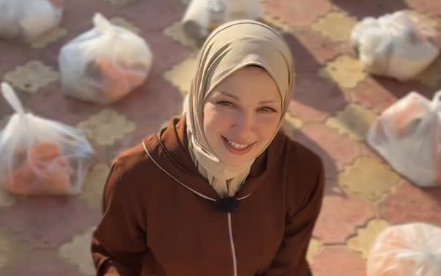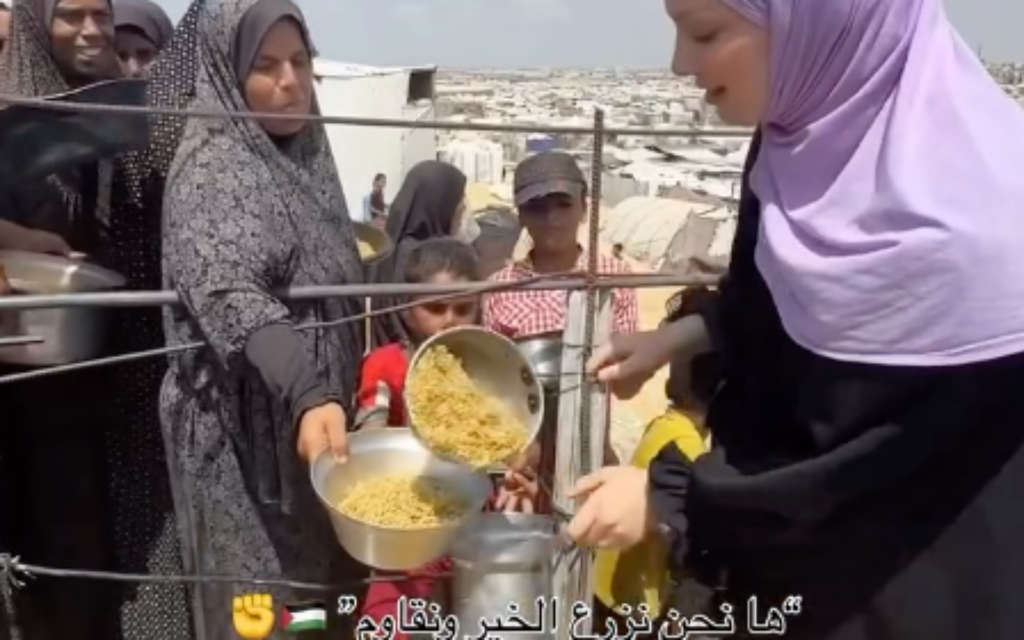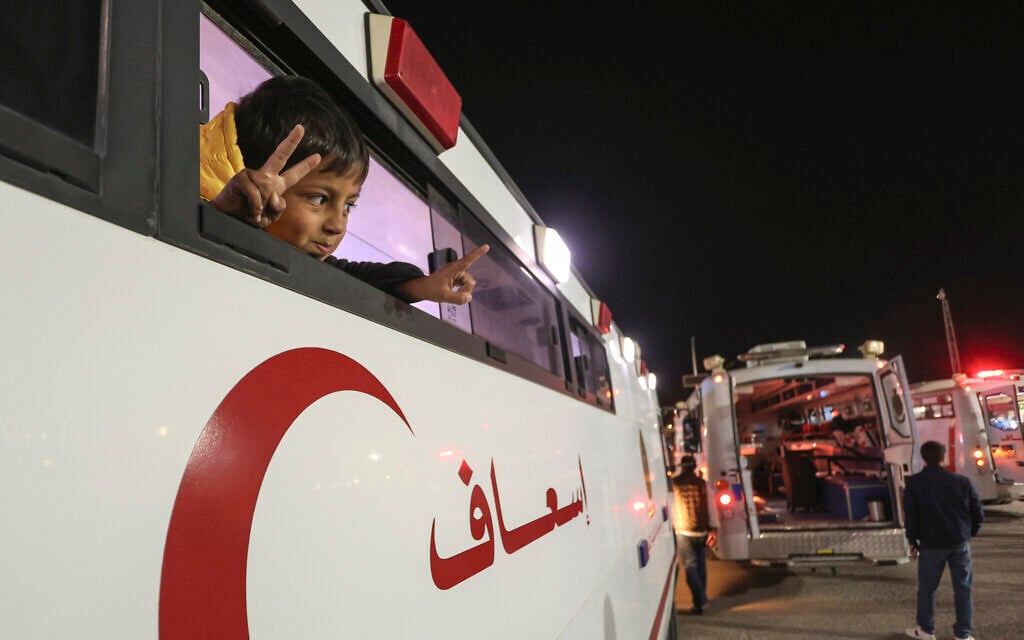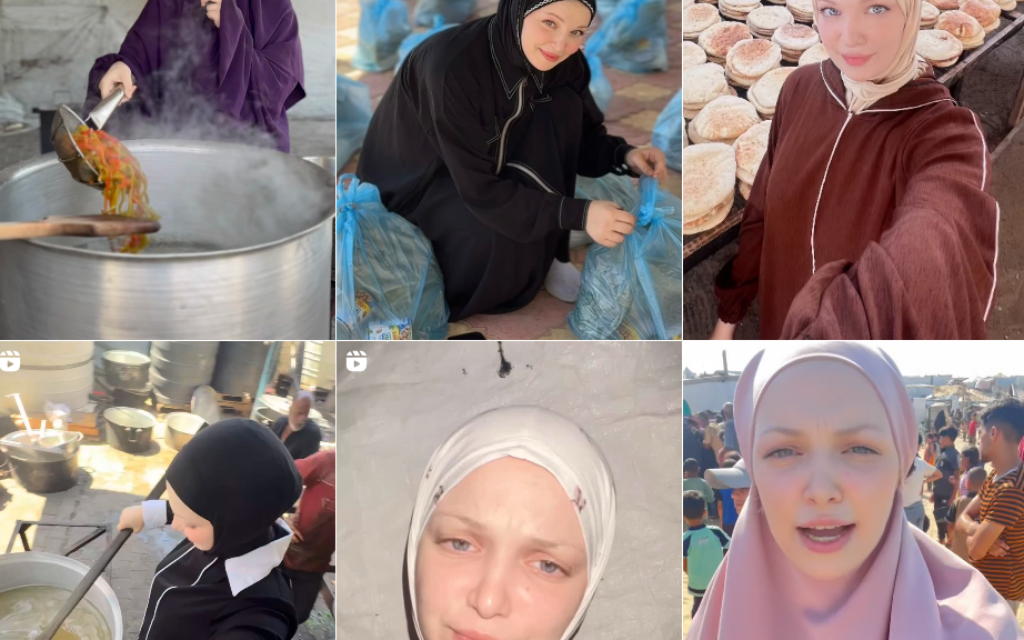


A single Instagram post by a well-known Gaza resident in recent days ignited an online storm in Palestinian circles.
The young woman, known on social media as “Malak Fadda” and widely popular among Palestinians, wrote on September 10: “Praise be to God — my brother was admitted for treatment abroad and I am accompanying him. Please pray for his safety.” The post included photos of her escorting a young man toward an ambulance, and in other images he appeared to be suffering from injuries to his head and arm.
Her post drew swift backlash online, much of it centered on claims that Fadda had raised substantial sums of money, supposedly for Palestinians in need, and then left Gaza despite having previously vowed never to do so. The claims of impropriety, widely circulated on social media, could not be independently verified.
The uproar reflects Fadda’s remarkable popularity online. A 22-year-old from Rafah, she has gained a massive following during 23 months of war — more than 3.4 million followers on Instagram and over 200,000 on TikTok, rare numbers for a person posting mainly in Arabic.
While some commenters offered warm wishes for her safety and her family’s health, many others reacted with anger to the departure of Fadda, who has been one of the more prominent faces of the hardships faced by Gazans and who founded an organization whose stated aim was to raise donations for Gazans affected by the war.
One person wrote on X: “She fled Gaza under a humanitarian pretext, leaving behind a million dollars of theft and betrayal. Malak Fadda is not sick but infected with something far worse: corruption and hypocrisy.” Another post read: “Malak left Gaza at the first opportunity with millions of dollars in her account, while the donations she advertised amounted to nothing more than crumbs.”
Several users resurfaced a clip of a March interview she gave Al Jazeera in which she declared: “We will not leave Gaza, because we are the land’s rightful owners. If they destroy it, we will rebuild. If our children die — we will bring new children.” The posters shared that video as ostensible proof of Fadda’s hypocrisy.
The accusations against Fadda come against the backdrop of her widespread renown during the war, as well as a general increase in Gazans seeking donations on social media since the conflict began.
Commenters argued that Fadda exploited her vast online popularity to raise money and gain fame and then, when the opportunity arose, fled the Strip, despite previously urging Gaza residents to remain on their land.
Some users employed very harsh language against Fadda. One wrote: “This is how they trade in blood — she fled to Jordan after raking in millions!”
Another called her “a Hamas influencer who broke our hearts with speeches about steadfastness,” adding: “She quietly escaped Gaza — first stop Jordan, next Europe.”
A third commenter viewed her as part of a broader trend: “Like every Palestinian, she has accounts for collecting donations for Gaza’s children and swore she would never leave her land… now she’s in Jordan.”
Fadda launched her Instagram account in May 2023, a few months before the October 7 Hamas-led attack on Israel set off the war in the enclave. It was in November of that year that she began uploading content regularly. Over the past two years, Fadda has documented life in Gaza amid the devastating conflict, gradually growing her audience. Thanks to her Instagram popularity, Fadda has also been interviewed by several Arab media channels during the conflict.
In her early wartime videos, Fadda spoke about the situation in Gaza and filmed herself performing everyday tasks such as baking bread. Before long, she shifted to documenting various charitable activities in which she took part: cooking in community kitchens, distributing food to the needy, and eventually founding an aid initiative under her own name, “Sunduk Malak (Malak’s Fund).” On the website, the organization claims to raise donations, though it has not declared the sums it has gathered.
In an interview with Al Arabiya in April 2024, Fadda said: “When I saw the situation deteriorating in Rafah — or in Gaza in general — it was necessary not to remain silent, but to act. I had an opportunity, I had a strong social media account — and from that point I started. People liked it and began to help.”
Throughout the war, Fadda has posted content with religious-Muslim themes aimed at boosting the morale of Gaza residents. In an August 2025 video, she addressed Gazans directly: “Why are you angry? Were you forbidden from entering Paradise? Don’t be sad, this world and everything in it is hard. Praise be to Allah, this is not our home.” She explained that earthly life pales in comparison to the afterlife.
Throughout the war, patients and the wounded have been allowed to exit the Strip, accompanied by close relatives, for treatment in third countries. Typically, the process involves the patient submitting a request to the Hamas-run Health Ministry in Gaza. If approved, the request is transferred to the World Health Organization, which coordinates the departure and contacts receiving states.
At times, Israel has taken part in efforts to secure host countries, and in some cases, patients have been approved for exit after countries specifically requested them — sometimes due to prior acquaintance through humanitarian representatives on the ground.
Following Fadda’s announcement of her departure, documents circulated online, allegedly from the Gaza Health Ministry, suggesting that Fadda herself — whose real name, according to the papers, is Malak Abu Ziadeh — was the patient in need of treatment. One document, dated to May, indicated she had been diagnosed with kidney stones.
This fueled claims on social media that she had secured evacuation abroad through personal connections. Mustafa Asfour, a Gaza resident, wrote on X: “After collecting millions of dollars under the pretext of ‘aid,’ she leaves for treatment through her contacts, while those far more deserving remain trapped in the Strip.”
Another document posted online bore the signature of Jordanian Interior Minister Mazen al-Faraya. In the letter, al-Faraya approved the departure of Mohammed Abu Ziadeh — believed to be the influencer’s brother — for medical treatment in Jordan, accompanied by two relatives, one of them listed as Malak Abu Ziadeh.
This, too, triggered backlash online. One user wrote on X: “Malak Fadda entered Jordan thanks to a personal letter from the Jordanian interior minister. We demand answers!”
Unusually, Hamas’s Al-Aqsa TV channel published a statement attributed to Gaza’s Health Ministry distancing itself from her departure. The statement read: “Malak Fadda received a medical referral classified as a non-urgent case for travel (outside the Strip) at this stage. The ministry had no involvement in her travel. She left through special coordination, without official involvement of the Health Ministry in the coordination procedures.”
In recent days the ministry issued a general statement, not mentioning Fadda by name, clarifying its classification system: “Cases are categorized by severity and the need for treatment abroad. Critical cases are referred for treatment through the World Health Organization, while others are delayed until a suitable opportunity arises.”
The ministry does not deal with approving which specific relatives exit alongside patients, only certifying the medical condition of the patients themselves. Throughout the war, the names of both patients and companions have been vetted by Israel, specifically the Coordinator of Government Activities in the Territories (COGAT).
COGAT did not respond to a Times of Israel inquiry regarding how and why Fadda left the Gaza Strip.
Beginning in August 2024, Fadda started posting TikTok videos showing herself wearing a vest with the label “Sunduk Malak.” According to its website, the organization, whose purpose is to raise donations, was founded by Fadda herself to assist Gaza residents. The phone number listed on the site is identical to a contact number that once appeared on her Instagram page.
The Times of Israel tried to reach the organization or Fadda through the number, but received no response.
Fadda has not addressed how she raised donations or what sums were received. Even in the face of accusations that she kept the money for herself, she has remained silent on the matter.
This is not the first time during the war that Fadda has faced criticism online. Last April, she posted a video in which she criticized the Arab world for not doing enough for the Gaza Strip. Viewers claimed she filmed the video from inside what appeared to be a luxury car, despite the dire economic situation in Gaza amid the war.
One wrote: “The lady runs a charity. She had nothing, and now, thanks to God, she has a 2020 Porsche Cayenne.”
In several recent videos, Fadda was seen wearing the uniform of Farj Global — a US-based aid group founded in 2023 by two doctors to support Palestinians in the West Bank and Gaza. Some of those clips were also shared on the organization’s official Instagram account. Farj Global did not respond to a Times of Israel inquiry about Fadda’s affiliation with the group.
Since leaving the Strip, Fadda has continued to post content about Gaza on her Instagram account. Between September 14 and 17, she shared several videos showing people wearing Sunduk Malak vests distributing water in the Strip, as well as offering food to displaced residents who fled southward from Gaza City due to Israel’s new offensive in the enclave’s north.
In recent days, reports have circulated online claiming that individuals affiliated with the Hamas administration in Gaza have also sought to leave the Strip. For instance, it was reported that Anwar Atallah, a member of Gaza City’s municipal council, exited the enclave in late August, traveling first to Jordan and then to Turkey.
COGAT confirmed that Atallah had departed with his family to Jordan. However, it added, other Hamas officials had applied for exit permits and were denied.




